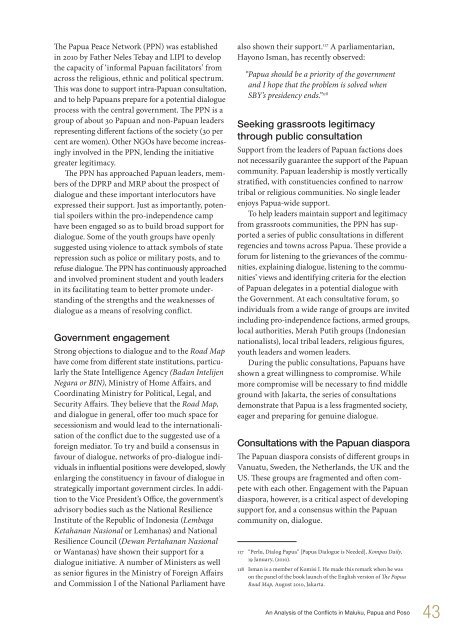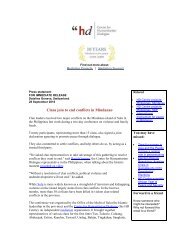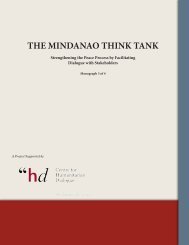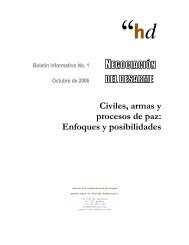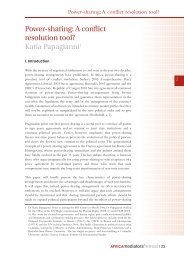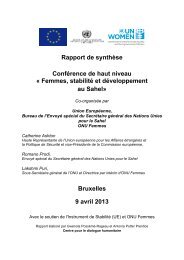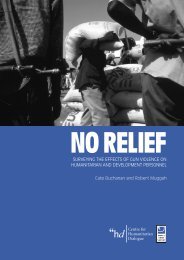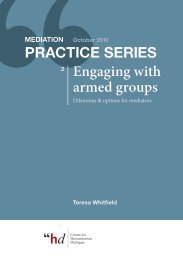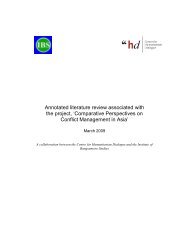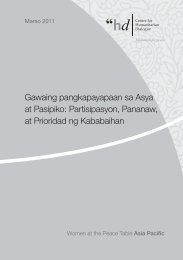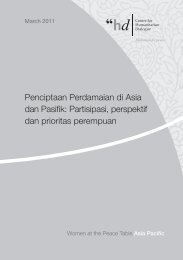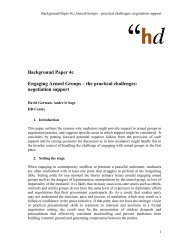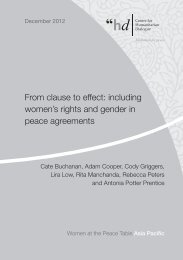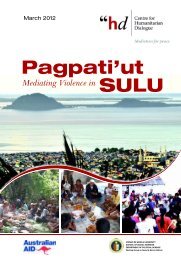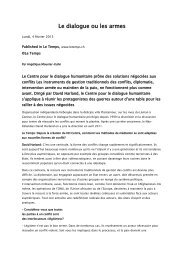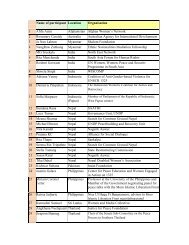Conflict Management in Indonesia â An Analysis of the Conflicts in ...
Conflict Management in Indonesia â An Analysis of the Conflicts in ...
Conflict Management in Indonesia â An Analysis of the Conflicts in ...
You also want an ePaper? Increase the reach of your titles
YUMPU automatically turns print PDFs into web optimized ePapers that Google loves.
The Papua Peace Network (PPN) was established<br />
<strong>in</strong> 2010 by Fa<strong>the</strong>r Neles Tebay and LIPI to develop<br />
<strong>the</strong> capacity <strong>of</strong> ‘<strong>in</strong>formal Papuan facilitators’ from<br />
across <strong>the</strong> religious, ethnic and political spectrum.<br />
This was done to support <strong>in</strong>tra-Papuan consultation,<br />
and to help Papuans prepare for a potential dialogue<br />
process with <strong>the</strong> central government. The PPN is a<br />
group <strong>of</strong> about 30 Papuan and non-Papuan leaders<br />
represent<strong>in</strong>g different factions <strong>of</strong> <strong>the</strong> society (30 per<br />
cent are women). O<strong>the</strong>r NGOs have become <strong>in</strong>creas<strong>in</strong>gly<br />
<strong>in</strong>volved <strong>in</strong> <strong>the</strong> PPN, lend<strong>in</strong>g <strong>the</strong> <strong>in</strong>itiative<br />
greater legitimacy.<br />
The PPN has approached Papuan leaders, members<br />
<strong>of</strong> <strong>the</strong> DPRP and MRP about <strong>the</strong> prospect <strong>of</strong><br />
dialogue and <strong>the</strong>se important <strong>in</strong>terlocutors have<br />
expressed <strong>the</strong>ir support. Just as importantly, potential<br />
spoilers with<strong>in</strong> <strong>the</strong> pro-<strong>in</strong>dependence camp<br />
have been engaged so as to build broad support for<br />
dialogue. Some <strong>of</strong> <strong>the</strong> youth groups have openly<br />
suggested us<strong>in</strong>g violence to attack symbols <strong>of</strong> state<br />
repression such as police or military posts, and to<br />
refuse dialogue. The PPN has cont<strong>in</strong>uously approached<br />
and <strong>in</strong>volved prom<strong>in</strong>ent student and youth leaders<br />
<strong>in</strong> its facilitat<strong>in</strong>g team to better promote understand<strong>in</strong>g<br />
<strong>of</strong> <strong>the</strong> strengths and <strong>the</strong> weaknesses <strong>of</strong><br />
dialogue as a means <strong>of</strong> resolv<strong>in</strong>g conflict.<br />
Government engagement<br />
Strong objections to dialogue and to <strong>the</strong> Road Map<br />
have come from different state <strong>in</strong>stitutions, particularly<br />
<strong>the</strong> State Intelligence Agency (Badan Intelijen<br />
Negara or BIN), M<strong>in</strong>istry <strong>of</strong> Home Affairs, and<br />
Coord<strong>in</strong>at<strong>in</strong>g M<strong>in</strong>istry for Political, Legal, and<br />
Security Affairs. They believe that <strong>the</strong> Road Map,<br />
and dialogue <strong>in</strong> general, <strong>of</strong>fer too much space for<br />
secessionism and would lead to <strong>the</strong> <strong>in</strong>ternationalisation<br />
<strong>of</strong> <strong>the</strong> conflict due to <strong>the</strong> suggested use <strong>of</strong> a<br />
foreign mediator. To try and build a consensus <strong>in</strong><br />
favour <strong>of</strong> dialogue, networks <strong>of</strong> pro-dialogue <strong>in</strong>dividuals<br />
<strong>in</strong> <strong>in</strong>fluential positions were developed, slowly<br />
enlarg<strong>in</strong>g <strong>the</strong> constituency <strong>in</strong> favour <strong>of</strong> dialogue <strong>in</strong><br />
strategically important government circles. In addition<br />
to <strong>the</strong> Vice President’s Office, <strong>the</strong> government’s<br />
advisory bodies such as <strong>the</strong> National Resilience<br />
Institute <strong>of</strong> <strong>the</strong> Republic <strong>of</strong> <strong>Indonesia</strong> (Lembaga<br />
Ketahanan Nasional or Lemhanas) and National<br />
Resilience Council (Dewan Pertahanan Nasional<br />
or Wantanas) have shown <strong>the</strong>ir support for a<br />
dialogue <strong>in</strong>itiative. A number <strong>of</strong> M<strong>in</strong>isters as well<br />
as senior figures <strong>in</strong> <strong>the</strong> M<strong>in</strong>istry <strong>of</strong> Foreign Affairs<br />
and Commission I <strong>of</strong> <strong>the</strong> National Parliament have<br />
also shown <strong>the</strong>ir support. 117 A parliamentarian,<br />
Hayono Isman, has recently observed:<br />
“Papua should be a priority <strong>of</strong> <strong>the</strong> government<br />
and I hope that <strong>the</strong> problem is solved when<br />
SBY’s presidency ends.” 118<br />
Seek<strong>in</strong>g grassroots legitimacy<br />
through public consultation<br />
Support from <strong>the</strong> leaders <strong>of</strong> Papuan factions does<br />
not necessarily guarantee <strong>the</strong> support <strong>of</strong> <strong>the</strong> Papuan<br />
community. Papuan leadership is mostly vertically<br />
stratified, with constituencies conf<strong>in</strong>ed to narrow<br />
tribal or religious communities. No s<strong>in</strong>gle leader<br />
enjoys Papua-wide support.<br />
To help leaders ma<strong>in</strong>ta<strong>in</strong> support and legitimacy<br />
from grassroots communities, <strong>the</strong> PPN has supported<br />
a series <strong>of</strong> public consultations <strong>in</strong> different<br />
regencies and towns across Papua. These provide a<br />
forum for listen<strong>in</strong>g to <strong>the</strong> grievances <strong>of</strong> <strong>the</strong> communities,<br />
expla<strong>in</strong><strong>in</strong>g dialogue, listen<strong>in</strong>g to <strong>the</strong> communities’<br />
views and identify<strong>in</strong>g criteria for <strong>the</strong> election<br />
<strong>of</strong> Papuan delegates <strong>in</strong> a potential dialogue with<br />
<strong>the</strong> Government. At each consultative forum, 50<br />
<strong>in</strong>dividuals from a wide range <strong>of</strong> groups are <strong>in</strong>vited<br />
<strong>in</strong>clud<strong>in</strong>g pro-<strong>in</strong>dependence factions, armed groups,<br />
local authorities, Merah Putih groups (<strong>Indonesia</strong>n<br />
nationalists), local tribal leaders, religious figures,<br />
youth leaders and women leaders.<br />
Dur<strong>in</strong>g <strong>the</strong> public consultations, Papuans have<br />
shown a great will<strong>in</strong>gness to compromise. While<br />
more compromise will be necessary to f<strong>in</strong>d middle<br />
ground with Jakarta, <strong>the</strong> series <strong>of</strong> consultations<br />
demonstrate that Papua is a less fragmented society,<br />
eager and prepar<strong>in</strong>g for genu<strong>in</strong>e dialogue.<br />
Consultations with <strong>the</strong> Papuan diaspora<br />
The Papuan diaspora consists <strong>of</strong> different groups <strong>in</strong><br />
Vanuatu, Sweden, <strong>the</strong> Ne<strong>the</strong>rlands, <strong>the</strong> UK and <strong>the</strong><br />
US. These groups are fragmented and <strong>of</strong>ten compete<br />
with each o<strong>the</strong>r. Engagement with <strong>the</strong> Papuan<br />
diaspora, however, is a critical aspect <strong>of</strong> develop<strong>in</strong>g<br />
support for, and a consensus with<strong>in</strong> <strong>the</strong> Papuan<br />
community on, dialogue.<br />
117 “Perlu, Dialog Papua” [Papua Dialogue is Needed], Kompas Daily,<br />
19 January, (2010).<br />
118 Isman is a member <strong>of</strong> Komisi I. He made this remark when he was<br />
on <strong>the</strong> panel <strong>of</strong> <strong>the</strong> book launch <strong>of</strong> <strong>the</strong> English version <strong>of</strong> The Papua<br />
Road Map, August 2010, Jakarta.<br />
<strong>An</strong> <strong>An</strong>alysis <strong>of</strong> <strong>the</strong> <strong>Conflict</strong>s <strong>in</strong> Maluku, Papua and Poso<br />
43


